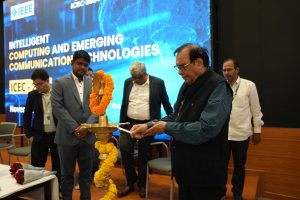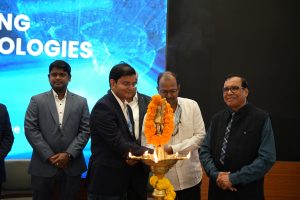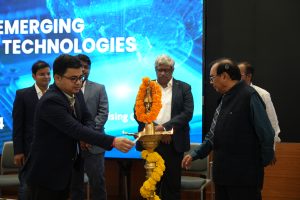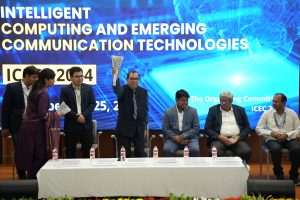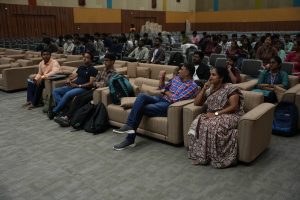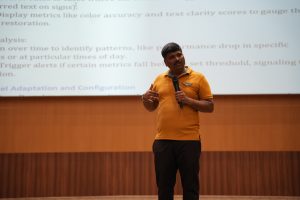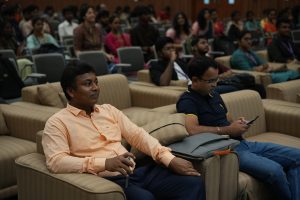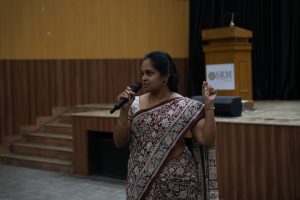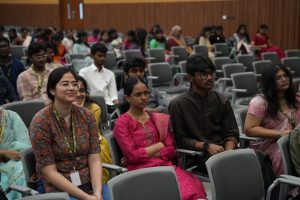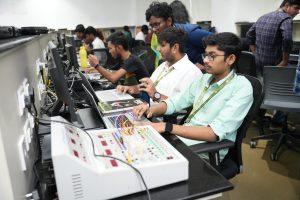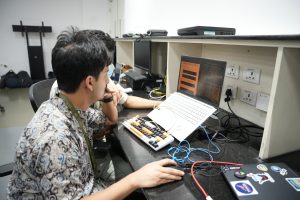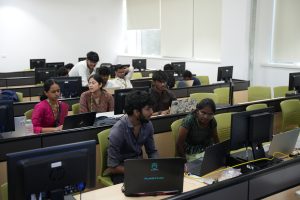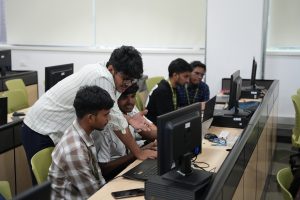ICEC-2024: A Pivotal Event in Emerging Technologies for Computing and Communication
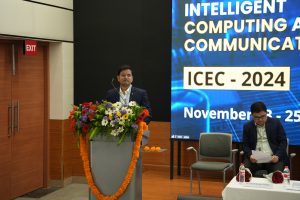 The International Conference on Emerging Computing and Communication Technologies (ICEC-2024) was successfully hosted at SRM University-AP, India, in collaboration with the IEEE Hyderabad Section and IEEE Guntur Subsection. The event served as a vital platform for discussing the latest advancements in computing and communication technologies, attracting a diverse group of scholars, researchers, industry experts, and students from around the world.
The International Conference on Emerging Computing and Communication Technologies (ICEC-2024) was successfully hosted at SRM University-AP, India, in collaboration with the IEEE Hyderabad Section and IEEE Guntur Subsection. The event served as a vital platform for discussing the latest advancements in computing and communication technologies, attracting a diverse group of scholars, researchers, industry experts, and students from around the world.
ICEC-2024 received an impressive 906 research paper submissions, showcasing the conference’s wide-reaching appeal. The organising committee maintained stringent review standards, ultimately resulting in a selective acceptance rate of 15%. This rigorous process led to 137 high-quality papers being accepted for presentation, highlighting the conference’s international recognition, with 24% of the accepted works originating from international authors.
The conference featured seven keynote presentations from distinguished speakers like Prof. Ganapati Panda, Ex-Deputy Director, IIT Bhubaneswar, Prof. Ashish Ghosh, Director, IIIT Bhubaneswar, Prof. Sudip Misra, IIT Kharagpur, Prof. Deepak Puthal, IIM Bodh Gaya, Prof. Korra Sathya Babu, IITDM Kurnool, Prof. Y Vijayalata, Chair, IEEE Hyderabad Section, Prof. Sreenivasa Reddy, Chair, IEEE Guntur Subsection. Their insightful talks offered valuable perspectives on emerging trends and technologies. The lineup also included contributions from other notable academics, enhancing the depth and breadth of discussion at the event.
Participants benefited from intellectually stimulating sessions led by esteemed chairs who facilitated discussions on a diverse range of topics, including artificial intelligence, machine learning, advanced networking, and quantum computing. This environment fostered a vibrant exchange of ideas, promoting innovation through collaborative efforts between academia and industry.
One of the conference’s core themes was the importance of collaboration in overcoming global challenges, emphasising how emerging technologies can play a crucial role in this effort. The high level of organisation and execution was made possible by the dedication of the ICEC-2024 organising committee, including the convener, Dr Sambit Kumar Mishra, and co-conveners Dr Jatindra Kumar Dash, Dr Murali Krishna Enduri, and Dr V M Manikandan. Their efforts, along with the assistance of volunteers and technical teams, ensured a smooth conference experience for all participants.
In recognition of outstanding contributions, 16 papers were awarded the best paper accolade for their exceptional quality. At the closing ceremony, Dr Sambit Kumar Mishra announced that all 137 accepted papers would receive publication in IEEE Xplore, indexed by Scopus. Moreover, approximately 10% of these works would receive extended invitations for submission to the SN Computer Science Journal, published by Springer.
ICEC-2024 left a profound impact on attendees, inspiring a continued pursuit of excellence in research and innovation. The conference not only highlighted the significance of emerging computing and communication technologies but also set the groundwork for future advancements in the field. As participants departed, the buzz of excitement and the spark of new ideas filled the air, marking ICEC-2024 as a truly remarkable event in the technology landscape.
- Published in Departmental News, News
Insights on (Re)Framing Identity by Dr Stella
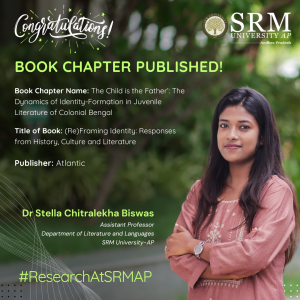 The complexities of identity in literature are a significant area of scholarly inquiry, especially in colonial and postcolonial studies. A key addition to this discourse is Assistant Professor, Dr Stella Chitralekha Biswas’ book chapter on “The Child is the Father: The Dynamics of Identity-Formation in Juvenile Literature.” in the anthology, (Re)Framing Identity: Responses from History, Culture and Literature by Atlantic Publishers & Distributors.
The complexities of identity in literature are a significant area of scholarly inquiry, especially in colonial and postcolonial studies. A key addition to this discourse is Assistant Professor, Dr Stella Chitralekha Biswas’ book chapter on “The Child is the Father: The Dynamics of Identity-Formation in Juvenile Literature.” in the anthology, (Re)Framing Identity: Responses from History, Culture and Literature by Atlantic Publishers & Distributors.
A Brief Introduction to the Book:
This anthology (Re)Framing Identity: Responses from History, Culture and Literature is a significant and timely effort to understand the issues of identity because in the postmodern age, it is one of the highly debated and discussed issues in the field of History, Culture and Literature. In the postmodern age, the question of identity with reference to literature becomes important because the monolithic idea of identity is challenged in both imaginative and critical works. The significance of this anthology also lies in the fact that it scrutinizes the process of identity formation in the Indian subcontinent and problematizes the notions of its unity and continuity across time and space philosophers. This anthology continues the tradition of the critique of identity formation right from Stuart Hall, who, in his article in Questions of Cultural Identity (1996) says, “The deconstruction has been conducted within a variety of disciplinary areas, all of them, in one way or another critical of the notion of an integral, originary and unified identity”. Therefore the purported aim of this anthology is to analyse the conflicts and amalgamation among numerous races, ethnic groups, religions, linguistic acommunities and various other stakeholders and to understand how these conflicts and amalgamations resulted in the formation of diversified identities in the light of Stuart Hall’s ideas, “identities are never unified and, in late modern times, increasingly fragmented and fractured; never singular but multiply constructed across different, often intersecting and antagonistic, discourses, practices and positions. They are subject to a radical historicization, and are constantly in the process of change and transformation”
Significance of the Book Chapter:
The understanding of identity formation has evolved from the philosophical understanding to its discursive formation and further to the neurological understanding of how identity is shaped. The fundamental idea followed in the anthology can be summed in by Stuart Hall, “actually identities are about questions of using the resources of history, language and culture in the process of becoming rather than being: not ‘who we are’ or ‘where we came from’, so much as what we might become, how we have been represented and how that bears on how we might represent ourselves. Identities are therefore constituted within, not outside representation. They relate to the invention of tradition as much as to tradition itself, which they oblige us to read not as an endless reiteration but as ‘the changing same’ not the so-called return to roots but a coming-to-terms-with our ‘routes’. They arise from the narrativization of the self, but the necessarily fictional nature of this process in no way undermines its discursive, material or political effectivity, even if the belongingness, the ‘suturing into the story’ through which identities arise is, partly, in the imaginary (as well as the symbolic) and therefore, always, partly constructed in fantasy, or at least within a fantasmatic field”. This particular analysis of identity formation in the Indian subcontinent under numerous pressures exerted through various mediums like literature, folk theatre and literature and philosophical texts not only in India but outside as well among the Indian diaspora located especially in Euro-American parts of the world, making this anthology a crucial book not only in the country but also at an international level.
Target Audience:
It is inspiriting to read such exhaustive literary anthology by eminent academicians and scholars and broadens one’s horizon of critical thinking as one goes through the collection. The book will definitely open up new trajectories of research in the field of postcolonial studies, bhasha literature and identity theory. It will also motivate students and researchers to explore the formation and representation of identities in the subcontinent in terms of culture, race, ethnicity, language, religion, caste, gender and politics.
- Published in Departmental News, English news, News, Research News
An Insightful Lecture on Student Migration

Prof. Irudaya Rajan, Founder Chair of the International Institute of Migration and Development and Distinguished Visiting Faculty at the Department of Economics, Easwari School of Liberal Arts, engaged with faculties, scholars and students on a compelling talk on “The Future of Student Migration” on November 22, 2024. Prof. Rajan delved into the crucial role of migration in shaping and redefining national demographics and offered valuable insights into internal and international migration trends, explaining their profound impact on labour markets, education systems, and policy-making. His talk sparked engaging debates and discussions, enriching the understanding of migration as a dynamic force in demographic change and national development.
During his visit, Prof. Rajan also interacted with faculty and students, discussing collaborative research projects and sharing his expertise. The session was a thought-provoking exploration of migration’s pivotal influence on global and local contexts, leaving the audience with much to reflect upon.
- Published in Departmental News, Economics Current Happenings, Economics News, News, Uncategorized
Industry Ignite Hackathon: A 24-Hour Innovative Experience
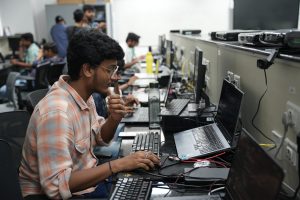 The Industry Ignite Hackathon, conducted at SRM University-AP from November 6 to 7, 2024, was organised by the Department of Electronics and Communication Engineering in collaboration with NanoChip through its Elevium Platform. The event specifically designed for BTech and MTech students, provided them with a valuable platform to address real-world challenges in embedded systems and to facilitate a connection between academia and industry. With a total of 250 participants divided into 18 teams, the hackathon offered a hands-on experience focused on industry-driven problem statements.
The Industry Ignite Hackathon, conducted at SRM University-AP from November 6 to 7, 2024, was organised by the Department of Electronics and Communication Engineering in collaboration with NanoChip through its Elevium Platform. The event specifically designed for BTech and MTech students, provided them with a valuable platform to address real-world challenges in embedded systems and to facilitate a connection between academia and industry. With a total of 250 participants divided into 18 teams, the hackathon offered a hands-on experience focused on industry-driven problem statements.
The inauguration took place at the APJ Abdul Kalam Auditorium, where industry experts from NanoChip presented a complex problem statement related to embedded systems. Following a comprehensive briefing on the hackathon’s rules and expectations, participants commenced their 24-hour coding marathon.
The hackathon concluded with a special session led by Mr. Hari, CEO of NanoChip, who delivered a talk on System on Chip (SoC) Design Flow, offering participants valuable insights into the design process and its applications within embedded systems. Subsequently, representatives from NanoChip showcased their Elevium Learning Process, introducing advanced tools and methodologies for high-performance embedded systems.
The valedictory ceremony celebrated the achievements of the participants, with awards and internships presented to the top-performing teams. The winning team received an Industrial Internship along with trophies and certificates, while the second and third-place teams were also recognised with trophies.
SRM University-AP extended its gratitude to NanoChip, the event sponsors, and the entire organising team, including Dr K A Sunitha, Dean of SEAS, as well as other faculty members, for their steadfast support. The hackathon served as a testament to the varsity’s commitment to fostering collaboration between academia and industry and providing students with opportunities to develop innovative solutions for real-world challenges.
- Published in Departmental News, News


